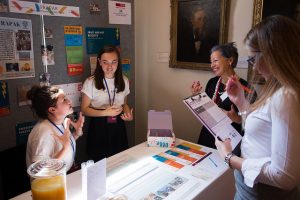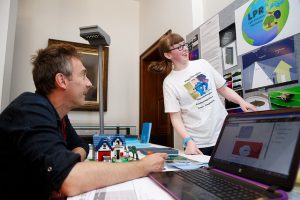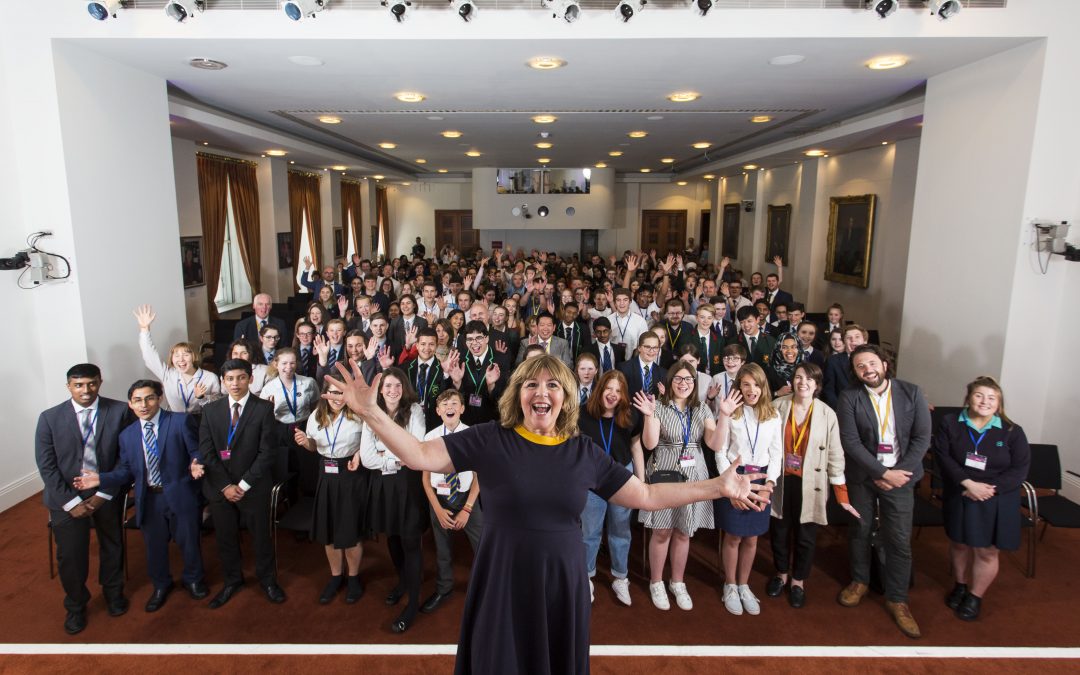 The next generation of innovators have been named at the 2018 TeenTech Awards at the Royal Society. Winning concepts include a medication dispenser for Alzheimer patients, drones that detect and absorb pollutants, an app that calculates a safe way home from school and a support for Parkinson’s sufferers. The Awards challenge students to use the power of science, technology and engineering to create innovative solutions to society’s biggest issues.
The next generation of innovators have been named at the 2018 TeenTech Awards at the Royal Society. Winning concepts include a medication dispenser for Alzheimer patients, drones that detect and absorb pollutants, an app that calculates a safe way home from school and a support for Parkinson’s sufferers. The Awards challenge students to use the power of science, technology and engineering to create innovative solutions to society’s biggest issues.
269 schools registered to take part in the Awards and over 1500 students were involved from schools across the UK and Europe. Sumair Mohammed from Evelyn Grace Academy was named teacher of the year and Dalziel High School collected the People’s Choice Award for its reinvented black box which was presented by Dame Sue Owen and Navroza Ladha from the Department for Digital,Culture,Media and Sport.
The ceremony was hosted by 2017 winner Thamina from Green Spring Academy and 2015 winner Jack from Reading School.
Each innovation was assessed by panels of over 40 judges consisting of celebrities, industry experts, journalists and eminent academics, including British theoretical physicist, Professor Jim Al-Khalili OBE, author, science and tech reporter Dallas Campbell, President of techUK Jaqueline de Rojas, Founder of Unruly,Sarah Wood, Rachel Neaman, cyber security expert Jessica Barker, young entrepreneur Ben Towers and Head of BBC Science Unit, Andrew Cohen. The winners will present their innovations to patron of TeenTech HRH Duke of York KG in a ceremony at Buckingham Palace in the Autumn.
You can view photos from the day here.
TeenTech co-founder and Tomorrow’s World presenter Maggie Philbin OBE says: “The 2018 winners can be really proud of their achievements. The standard of entries was exceptionally high this year and demonstrate that with support from the TeenTech Programme, teenagers can conceive and create incredible ideas and projects. This is vital in creating enthusiasm for engineering, science and technology in schools so that we can inspire the next generation of innovators.”
Schools and students taking part in the TeenTech programme are provided with resources and year-round support including access to a team of expert mentors. They can also attend a series of live innovation events and workshops with more than 200 scientists, engineers and technology pioneers from companies such as Accenture, Atkins, Chartered Institute of Library and Information Professionals, GSK, JVC Kenwood, Symantec, FDM Group, Cross Country Trains, Rolls Royce and Lloyds Banking Group.
Teacher Nick Bury from Minehead Middle School says: “It is a fantastic opportunity for children from a very rural background to experience technology at an outstanding level.”
 Louie Evans of Bromley High School says: “This has been a great opportunity for our pupils to take a lead in their own project and the first steps to being leading female engineers, designers or scientists.”
Louie Evans of Bromley High School says: “This has been a great opportunity for our pupils to take a lead in their own project and the first steps to being leading female engineers, designers or scientists.”
Maggie says that the real impact of the initiative can be measured in the changes that take place in the schools that take part, she explains: “What we’ve witnessed over the years is that having students taking part, whether they win or not, makes a real difference to the whole school community; they inspire other children to want to do the same.
“Many schools started out tentatively with a small group of students and are now involving whole year groups such is the demand to take part from their students. In many cases, this has lead to a rise in students wanting to study design and technology, and engineering.”
2018 Winners
Years 7 – 11
Energy
BioPump from Loughborough Grammar School, Loughborough
An electronic water pump that is completely self-sufficient and environmentally friendly.
Future of Rail
Travel Anywhere Case from Ranelagh School, Berkshire
A smart case that combines a mode of transport, light travel case, work space and seat, space to hold an iPad and morning coffee.
Health (joint winners)
Copper Assist from Sheffield High School, Sheffield
Created with the intention of trying to prevent infections after surgery. The product is a bandage with a concentrated patch of copper.
Simple Reminders from The Greenwich Free School, Greenwich
A reminder app for families that links with a screen inside a cushion for patients with onset dementia.
Education
Simpletexts from Sandbach High School, Sandbach
An app that will scan text which the user is finding confusing or complicated and automatically simplify and summarise it to a standard which is understandable
Wearable Tech
Echolocanimals from Bromley High School, Bromley
Earrings that use ultrasound echolocation, alongside the processing power of a phone, to give visually impaired people information about their surroundings.
Music, Media and Entertainment
The Augmented Reality Comic Book from Evelyn Grace Academy, Lambeth
Physical comic book that can be used with a smartphone app. Hovering a smartphone on a page will bring to life the characters and generate a videogame that appears in your environment.
Environment
Geotex from Farlingaye High School, Suffolk
Intelligent flying drones that can identify pollutants and absorb them. They detect and analyse pollutants and create paths of trends in polluted areas autonomously.
Safety and Security
Project School from Channing School, London
An app that calculates a secure route for school children to get home safely.
Fashion and Retail
Fashion Fusion from Farlingaye High School, Suffolk
An app which logs your clothes as you buy and can be recalled to ensure no wastage. It allows you to select items based on your mood, event type, etc. and can help with selling unwanted clothes easily and suggesting what clothes may be suitable for you.
Design and Construction
Contain Your Future from Healing School, Lincolnshire
A sustainable housing project using old shipping containers to create affordable housing for the homeless in Grimsby. The project aims to consider the different elements of people’s lives in order to create an environment in which they want to live and make their first steps out of poverty.
Future of Food
AFRAPAK from Thurston Community School
AfraPak is a non-profit catering solution providing nutritional aid to those in impoverished and famine areas of Africa.
Future of Transport
LED Skateboard from Minehead Middle School, Somerset
New skateboard that features LED wheels and rims, speakers for playing music
Digital Skills
Memory Medication from Horbury Academy, West Yorkshire
Medication dispenser that will ensure that people with memory problems, such as Alzheimer’s disease, take their medication.
Manufacturing
Light Pollution? Why? from Amelia Roberts
An affordable smart attachment for existing lamp posts to reduce light pollution: LPR – Light Pollution Resolution! Cutting off the glare, but still providing sufficient lighting for roads etc.
Research and Information Literacy
Device to identify sugars in foods from The Ladies College, Guernsey
Research on the amount of sugar and vitamin C in fruit drinks which is then used this to design a machine that will tell diabetics whether a fruit juice has more or less than 5g.
Tech for All
Solar Pi from St George’s School, Birmingham
Raspberry Pi based solar powered computer is designed to teach people about coding and digital skills in the developing world.
Years 12-13
Best Innovation – Concept
Aether Motion from WMG Academy, Coventry
New medical aid to address the psychological issues of many patients and bring about much needed change in the design of today’s medical aids and physical impediment support products.
Best Innovation – Model, prototype or product
Anti-motion Stabiliser from Mill Hill School, London
Provides a way of supporting those suffering from Parkinson’s or other disabilities, to achieve a useful level of physical dexterity when undertaking simple domestic tasks that previously were affected by involuntary shaking or tremors, and reduced muscle capability.
Best Research Project
Under-representation of women in computer science from Oakham School, Rutland
An inquiry into the causes of the under-representation of women in computer science.
Data Science (joint winners)
Sensor Track from Sandbach High School, Sandbach
A testing rig composed of 80 infrared sensors positioned every 20cm along the 16m track. All the sensors are grouped and connected through Arduinos, which measure the time intervals between the them being tripped. Data is collected and analysed, through the creation of velocity time graphs, which then allowed modifications to be approved, changed or discarded based on their performance.
Vertigo from Sutton Grammar School, Surrey
A data logger used to track position, acceleration and rotation of an object in a world frame of reference. The device can be used to provide real-time feedback to wingsuit flyers on their angle of attack, using data manipulation scripts created in MATLAB.
People’s Choice Award
Cloud Data Storage from Dalziel High School, North Lanarkshire
Planes go missing and sadly we can’t prevent this.We aim to create a world in which when planes go down we answer the questions that families and friends have. Our re-invented black box will have the ability to stream important data and location information right back to the people who need it most.
Teacher of the Year
Mr Sumair Mohammed from Evelyn Grace Academy


I would like to find out more about the topic which Amelia Roberts put forward in the Years 7-11 Winners category, namely Light Pollution? Why?
I work in the Street Lighting Field and I am interested to find out more about her project and what it entailed – did she present a paper and if so is it possible to forward it to me?
Hi Graham
If you are happy we can pass on your details to the student’s family. She did some very impressive work .
Kind regards
Maggie